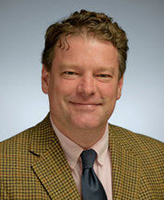
From the tropical rainforest of the Amazon to rural villages in Japan, Christopher Ball has traveled to study how language and other forms of communication fit into people’s lives. Now he has brought his work to Notre Dame as an assistant professor in the Department of Anthropology.
“Christopher Ball provides a terrific synergy with his approach to how people use language, meaning, symbol, and ritual, and how that impacts their daily lives,” says Agustín Fuentes, professor and chair of the Department of Anthropology. “His dual focus in Japan and Amazonia also adds to our geographic breadth and provides an excellent opportunity for students to learn and engage with the important perspectives he brings.”
Ball says Notre Dame’s combination of scholarship and humanitarianism attracted him to the University. “There is support of research here that does good things for people wherever they are. For an anthropologist, that’s a great mission,” he says. “The anthropology department was really welcoming and it felt like a good match.”
Listening and Asking
Ball takes a hands-on approach to research. “I’m there in the community, listening, asking questions, and recording conversations. I want to know how people actually use language in daily life.”
His next project in the Amazon focuses on a small indigenous tribe known as the Wauja. His goal is to build an enthohistorical narrative from the tribe’s perspective that will serve as a repository of knowledge for people who want to know about its history. It will include access to recordings, which Ball plans to link to digital maps that will show the important sites and stories associated with the Wauja.
“The idea is to relate the data from all kinds of settings—conversations, interviews, ritual moments—to the culture and religion, and also to social actions, the planning and strategizing, creating alliances and communities. I want to find the differences and commonalities.”
In Japan, Ball is studying language and religion in a small rural community that, like many others, has seen an economic downturn as the population shifts to urban areas—a trend called rural flight.
“I’m interested in how these countryside towns are trying to revitalize not only their local economy, but their reason for living—the value of their ways of life and traditions in the face of schools and hospitals closing, old people dying, and young people moving away,” he says.
Advocate for the Unheard
At Notre Dame, Ball is excited about the new Anthropology Ph.D. program that will start in fall 2014. More than 90 students have applied for the first incoming class.
“There is talk in academia in general about the glut of Ph.D.s with too few jobs, but we’re trying to start a small program that will train people for a whole range of post-graduation opportunities and tailor the program for each individual student,” Ball says.
“Anthropology is a discipline that has a little bit of everything and a broader point of view than a lot of other disciplines. And we are advocates for a lot people around the world who otherwise wouldn’t have their voices heard.”
Ball is teaching a required course for second-year majors called “Fundamentals of Linguistic Anthropology.” This year he is also teaching two courses that build on that introduction: “Language and Culture” and “Language in Power.” And next year, he will begin teaching courses that are more directly related to his interests in Brazil and Japan.
“I’ll be hoping to make connections for undergraduates between my research and teaching,” Ball says.
Learn More >
- Department of Anthropology
- Christopher Ball faculty page
- Related story: Notre Dame Announces New Ph.D. Program in Anthropology
Originally published by at al.nd.edu on March 31, 2014.